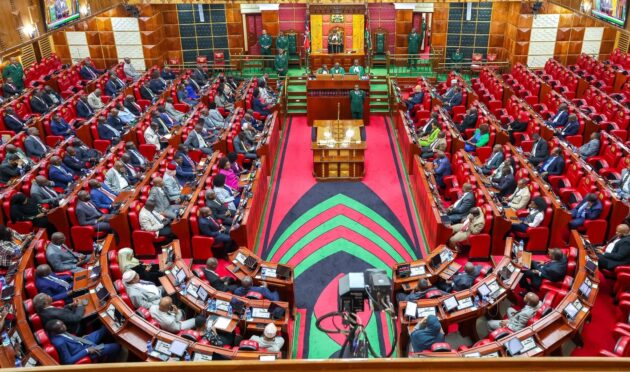
47 Women Representatives Oppose Sh500mn NGAAF Budget Cut » Capital News
NAIROBI, Kenya, Apr 29 — Women Representatives from all 47 counties have voiced strong opposition to the government’s decision to slash Sh500 million from the National Government Affirmative Action Fund (NGAAF), calling the move unjust and a direct threat to grassroots development initiatives targeting women, youth, and vulnerable groups.
The issue came to the fore in Parliament when Busia Woman Representative Catherine Omanyo condemned the cut, describing it as both demoralizing and disruptive to the planning and implementation of constituency programs.
“This is deeply disheartening. Mr. Speaker, the 47 Woman Reps in this country are bleeding right now. All of them have been castrated with a blunt Burdizzo. We usually think on our feet and ahead of the curve by planning. Everybody here plans. And when you plan and somebody comes and puts a hitch, then you are left with theory but no pragmatism,” Omanyo said.
Her comments followed a disclosure by Treasury Cabinet Secretary John Mbadi that the NGAAF budget had been reduced from Sh3.2 billion to Sh2.7 billion following a government-wide rationalization of spending. Mbadi noted, however, that Sh1.1 billion owed to the fund had recently been released.
Despite this, Woman Representatives insist the cut severely undermines their ability to deliver on their mandate.
“The money itself is meagre too little to begin with. We demand that the Sh500 million must find its way back to the NGAAF kitty. Mr. Speaker, how do I go to Busia and tell them I am representing them, if the money was taken while I sat here pretending to be sober?”she posed.
Mombasa Woman Representative Zamzam Mohammed also weighed in, expressing concern over contradictory statements from Treasury officials regarding the origin of the cut.
“Women from 47 counties have been looked down upon. I asked the Treasury CS, and he claimed the monies were deducted in Parliament, yet it is clear they were deducted at the Treasury. I urge our constituents not to turn their anger on usthis is not our doing,” she stated.
Laikipia Woman Representative Jane Kagiri, who chairs the 47 Women Representatives Caucus, announced plans for coordinated action to protest the decision by moving to the National Treasury to demand answers.
“We are wearing black to mourn this deduction, which is an injustice not only to us but to the people of Kenya. Pink represents the NGAAF colours. We will march to both the NGAAF offices and the National Treasury to demand accountability,” said Kagiri.
Eldas MP Adan Keynan also criticized the deduction, terming it a regressive step that reverses hard won gains for women in political leadership through the 2010 constitution.
“It’s not fair to deny them a right that has already been granted. I want to appeal to the mandarins at Treasury to show consideration when making such decisions. Women are the majority of voters in this country. Denying them Sh500 million is not just unfair it is politically and morally wrong,” said Keynan.
Budget and Appropriations Committee Chairperson Samuel Atandi acknowledged the concern raised by the lawmakers and pledged to urge Treasury to release the funds by invoking Article 223.
“As a matter of responsibility, I will meet with Treasury officials and push for the invocation of Article 223 of the Constitution to facilitate the release of the withheld funds,” he said.
Article 223 allows for the government to spend public funds not yet approved by Parliament in exceptional circumstances.
NGAAF is a critical funding mechanism used by Woman Representatives to implement socio-economic programs that support women, youth, and persons with disabilities across Kenya.
The fund enables grassroots initiatives ranging from economic empowerment and health projects to bursary programs and shelter provision for vulnerable groups.
A recent report by the Office of the Auditor General revealed that approximately Sh554.3 million allocated to NGAAF in various counties remained unspent and was lying idle in bank accounts.
The 2023/2024 report noted that despite widespread need, several counties held large balances, indicating gaps in disbursement, planning, or execution.